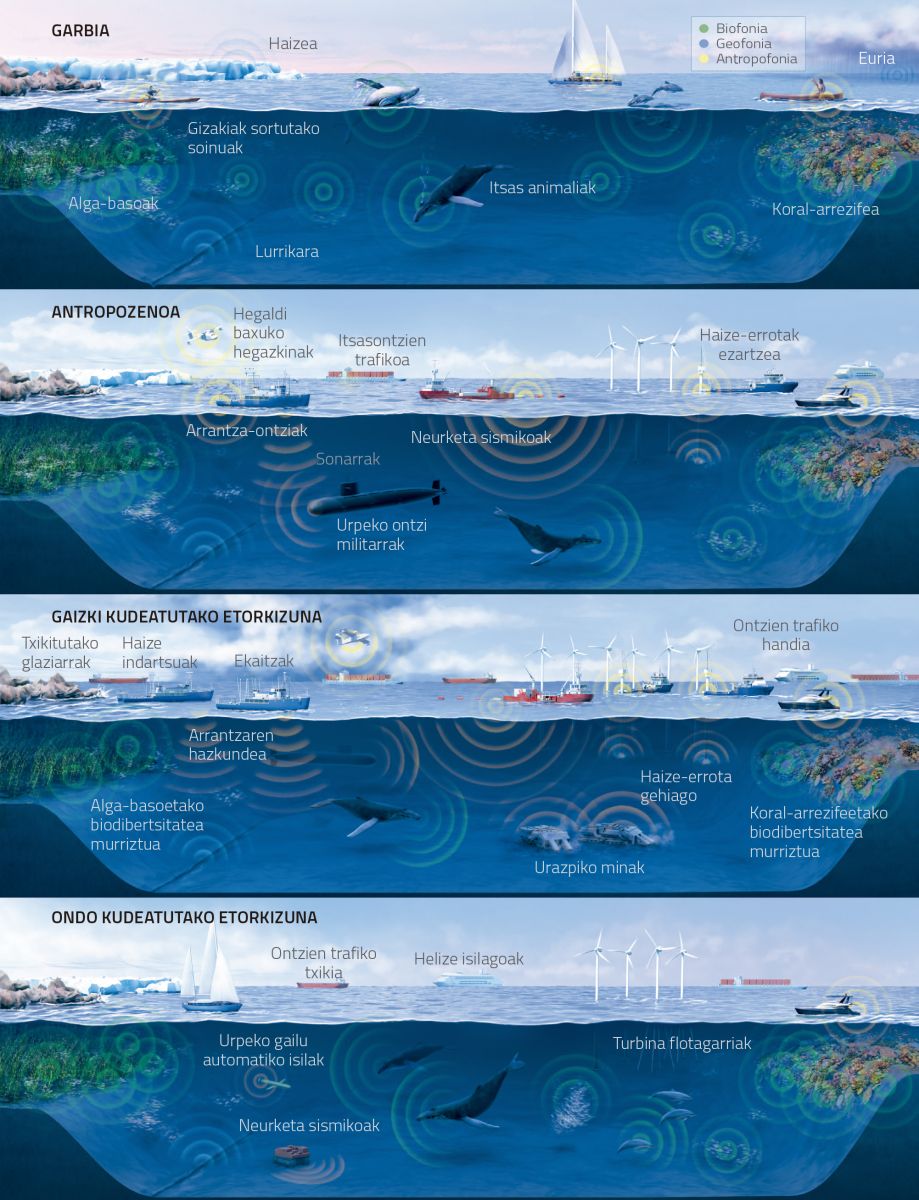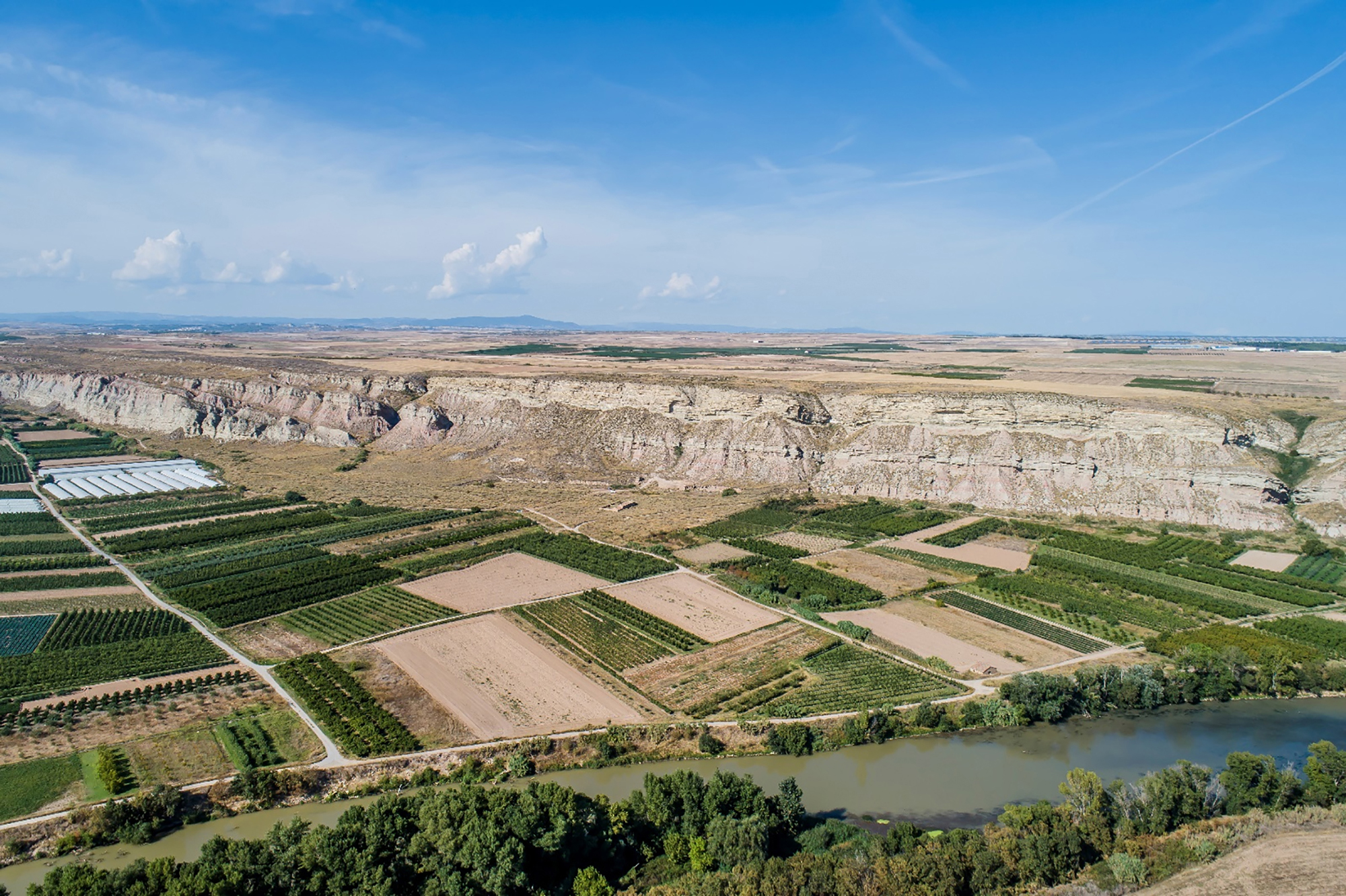The sound of the ocean is changing.
- Scientists say the sound of the ocean is changing because of human activities at sea.

Sound is fundamental in the marine sensory environment, as sound is the signal that travels further in the waters of the ocean. As the basic sense of many marine animals, researchers claim that the noise of human activities creates great confusion. They consider it irresponsible that there is still no firm legislation to promote the transition of anthropogenic noise at sea and call for noise pollution to be limited in binding international agreements.
Through sound, animals interpret the marine environment. In fact, sound goes further and deeper than light or any chemical compound. They use it to explore the environment, navigate, hunt, create group cohesion, protect the territory, spread the screams of death and communicate with their closest and distant companions, both of their own species and of other species.
The Atlantic cod and groupers use the sounds to bring the group together and coordinate egg laying tasks. Shrimp produce the sound of "snapping" to stun prey, until they hear strong "cascades" in coastal habitats with compact shrimp colonies. Dolphins, sperm whales and mazopes have sophisticated sonar systems for harming and chasing dams underwater. The larvae of the invertebrates of the reefs listen to the sounds of these landscapes to choose where they're going to be fixed. And male gibose whales sing complex songs in the dialect of the region as a sign of their reproductive capacity. Each marine ecosystem has its own chanting.
Bustling human oceans
With the onset of anthropocene, the crunchy sound of human activities in the ocean has spread: seismic studies to detect deposits of oil and gas produce continuous sounds of high energy, low frequency and short duration; the seabed scanning probes, high frequency sounds; the military use sonars of varying frequency to detect undersea vessels; the wind parks at sea, in recent years, become predominant channels.
Anthropogenic noise has altered ocean sounds, biophonies and geophies: it has created new noises in many places and, in other cases, it has eliminated natural singing from the sea, which disorients and displaces animals, emptying ecosystems from coral reefs.
A scientific study of the last four decades has revealed that there is conclusive evidence that anthropogenic noise is harmful to marine mammals, fish, invertebrates and seabirds. There are animals that can modify the frequency of the sounds they produce for the limbs to listen to them, but in many others, it completely conditions the ear and causes significant physiological and behavioral changes, such as invertebrate larvae, for example, are fixed in an inadequate space due to anthropophony, jeopardizing the viability of adult animals.
Here you can hear a lot of sounds recorded by researchers in the ocean: fish, mammals, crustaceans, insetos, ice, water and even humans.
It's time to take action
The authors conclude the need for a systematic evaluation of marine anthropogenic noise, as is done with the emission of CO2 and segregated organic pollutants, otherwise, if systematic data are not available, the problem is discarded. They have also pointed out that, unlike other sources of pollution, once the sound source is removed, anthropogenic noise does not persist in the environment, so measures taken can have almost instantaneous positive effects.
They have represented the future in the light of the measures to be taken:

There are technological solutions that the maritime industry can adopt to mitigate noise, but they are not enough, according to researchers. The ocean-based economy is rising and its contribution to global gross domestic product is expected to double by 2030. Therefore, in the International Year of Sound, they have called for the limitation of anthropogenic noise by means of laws. Not only in national laws, but they have also considered it necessary to limit noise pollution in binding international conventions.
Last week, during the blackout, seeing ourselves vulnerable, we began to investigate many people in order to understand what happened: how does the infrastructure that transports electricity work? Why is it getting old? I am fascinated by the physical phenomenon of electricity... [+]
Automatizazioaren eta abereen inguruan kuxkuxeatzen ari nintzela, ukuilu automatizatuen informazioa hasi naiz eskuratzen. Nire idazmahaiaren erosotasunetik idazten, gizakion kontsumorako modu masiboan esplotatzen ditugun abereen bizitzak nahiko penagarriak direla iruditzen zait,... [+]
Last week I had a nice meeting with a group of women that I hadn’t seen for a long time, and we talked about doing it, linked to spaces of technology and creation.
The oldest of these women, who is on the frontier of retirement, is a programmer and enjoys programming code... [+]
Economists love the charts that represent the behaviors of the markets, which are curves. I was struck by the analogy of author Cory Doctorow in the article “The future of Amazon coders is the present of Amazon warehouse workers” on the Pluralistic website. He researches the... [+]
Wikipedian bilatu dut hitza, eta honela ulertu dut irakurritakoa: errealitatea arrazionalizatzeko metodologia da burokrazia, errealitatea ulergarriago egingo duten kontzeptuetara murrizteko bidean. Errealitatea bera ulertzeko eta kontrolatzeko helburua du, beraz.
Munduko... [+]
Nortasuna Sarean jardunaldien 10. edizioa egingo dute asteazken honetan Donostiako San Telmon, KomunikaziONA bideguruatzean izenburupean. Egungo komunikazio joerak aztertu eta "alternatiba osasuntsuagoak" topatzen saiatuko dira. Hainbat hizlari gonbidatu dituzte, euren... [+]
Orain dela 20 bat urte, berrikuntzaren inguruan master bat egin nuen. Bertaraturiko gonbidatu batek esan zigun gizakion historian berrikuntza teknologikoaren eragile handiena gerra izan zela. Gerra, halaber, eragile handia da botere harremanen berrikuntzan.
Berrikuntzaz ari... [+]
















